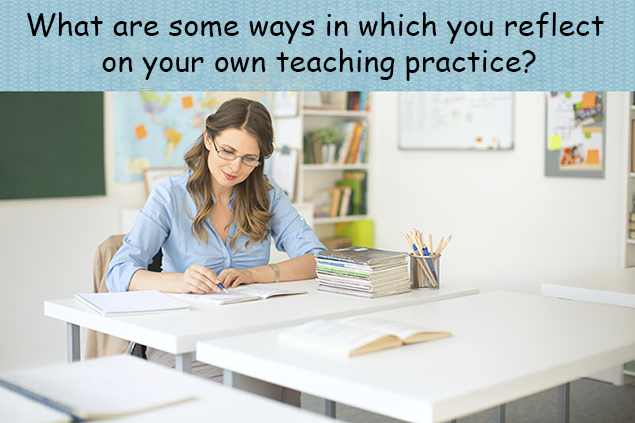How Can Teachers Practice A Reflective Approach To Teaching And Learning?
Posted by Network Support · Leave a Comment
Learning Through Reflection
Be a reflective educator to enrich your teaching…
Just as other professions require specific approaches to development, reflective practice at an individual and group level is required for developing professional educators of high quality and efficiency. Every teacher has a different style and strategy when interacting with students. Their abilities and strengths will also vary. Therefore, expecting a uniform input and response is highly unrealistic. Given the uncertainties and unpredictable reactions of students to classroom learning or activities and to the everyday decisions made in the classroom, there is a great need for teachers to engage in critical inquiry and thoughtful reflection.
Reflection is an active thought process aimed at understanding what has been discussed and leading to a subsequent improvement in the way something is approached or done. Thus, developing reflective practice and continuous learning is foundational for the highest professional competence in the field of education. Reflection can occur in different ways and for different purposes.
Types of Reflection
1. Reflection-IN-Action
Reflection-in-action refers to on-the-spot evaluation. Although difficult to perform, it is very powerful whenever practiced. Reflecting while events are occurring allows the teacher to make improvements while teaching. It is a process in which teachers can reshape or redirect the lesson as they deliver it. Typically it is an on-going process that aids in instant and practical solutions.
Reflection-in-action, demands the full concentration and attention of the teacher. There is no place for trial and error here. Instead, reflection-in-action is a conscious effort on the part of the teacher. If something doesn’t seem to be working correctly toward a certain goal, then the teacher “reflects” (which is done consciously or deliberately) on this, and makes instant adjustments in order to achieve the goal.
2. Reflection-ON-Action
Reflection-on-action is the process of reflecting on an event or experience after it has occurred, to learn from it and influence future action.
Due to the multiple demands of teachers in classrooms, they are often unable to reflect during an event (reflection-in-action). For instance, teachers are generally so intent on completing a lesson that it becomes difficult to concentrate and pay conscious attention to every student’s response. Hence, reflection often needs a different perspective, where one looks back into the past and assesses the event that has already occurred.
This type of reflection has been also labeled as ‘recollective reflection’ as it encourages recollection of past experiences. Reflection-on-action is the most widely used form of reflection practiced by teachers as it is very challenging to reflect while being engaged in teaching a lesson with numerous matters simultaneously vying for attention.
The process involves converting information into knowledge by carrying out a cognitive examination. Reflection which occurs about past events and experiences can be supported by systematic records, including journals, diaries, photographs and recorded observations.
3. Reflection-FOR-Action
This type of reflection is said to be the desired proactive outcome of both reflection-in-action and reflection-on-action.
Reflection-for-action is the process of analyzing events and behavior with the sole purpose of making changes in the future. According to this reflective practice, the purpose of reflection is not merely to think upon past events, experiences, or behaviors, but to guide positive future action.
Teachers can practice reflection-for-action, to prepare for the future by assessing the information gathered from what actually happened in the class and what they reflected upon after the class. This also allows them to identify any dissonance between their beliefs and actual practices.
Teachers who practice reflection-for-action are able to move forward from focusing on the non-desirable events and experiences of the present and concentrate on how to change the situation into what they want it to be. This gives them an action plan for the future.
Like this article for teachers?
Browse the Professional Learning Board COURSE CATALOG to find related online courses for teachers in your state. Professional Learning Board is a leading provider of online professional development classes that teachers use to renew a teaching license or renew a teaching certificate.





